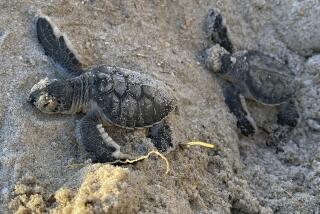Cute Little Disease Carriers
- Share via
The United States is spreading the bacterial gastrointestinal disease salmonella around the world by exporting small pet turtles. The Food and Drug Administration in 1975 banned the domestic commercial distribution of turtles less than four inches long after medical investigations proved that 14% of human salmonella in the United States was attributable to these pets. Apparently our government doesn’t care, however, if children in other countries get violently ill from contact with these turtles, for, according to the Journal of the American Medical Assn., American turtle farmers export 3 million to 4 million turtles a year to European, Latin American and Asian countries.
The recently published study, by Dr. Robert Tauxe of the Centers for Disease Control in Atlanta, revealed that in Puerto Rico in 1983 one child was hospitalized for turtle-related salmonella for every 1,000 turtles that were shipped to the island. According to Tauxe, this figure probably applies to any place in the world that receives the turtles. The number of salmonella infections is actually much higher, because most cases don’t require hospitalization. Tauxe said that 4 million American-grown turtles could infect up to 400,000 children worldwide.
American industries export pesticides, obsolete pharmaceuticals and many other hazardous materials that have been banned in the United States, but the sale of pet turtles abroad is especially insidious. The turtles seem like perfect pets for small children. The Puerto Rico study proves conclusively that they are not.
No U.S. industry should be allowed to infect thousands of children abroad with a potentially fatal disease. From 25 to 30 farms, mostly in Louisiana, raise the turtles that transmit salmonella. This industry hurts many more people than it supports, and the U.S. government could diminish a global health threat by banning the breeding and exportation of disease-carrying turtles.
More to Read
Sign up for Essential California
The most important California stories and recommendations in your inbox every morning.
You may occasionally receive promotional content from the Los Angeles Times.













